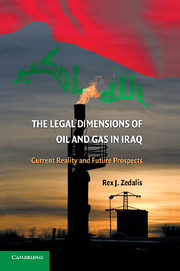Book contents
- Frontmatter
- Contents
- Foreword
- Acknowledgments
- Prologue
- PART ONE THE CONTEXTUAL BACKGROUND
- 1 Facts Regarding Iraqi Oil and Gas Reserves and Their Legal Status Prior to Self-Governance
- 2 The Provisions of the Iraqi Constitution Addressing Oil and Gas Activities: Of the Role of Subcentral Governing Entities, Handling of Revenues, and “Present” versus “Future” Fields
- PART TWO THE COMPLICATIONS ASSOCIATED WITH IRAQI LEGISLATIVE MEASURES
- PART THREE CURRENT ISSUES AND POTENTIAL FUTURE PROBLEMS
- Epilogue
- Index
1 - Facts Regarding Iraqi Oil and Gas Reserves and Their Legal Status Prior to Self-Governance
Published online by Cambridge University Press: 07 December 2009
- Frontmatter
- Contents
- Foreword
- Acknowledgments
- Prologue
- PART ONE THE CONTEXTUAL BACKGROUND
- 1 Facts Regarding Iraqi Oil and Gas Reserves and Their Legal Status Prior to Self-Governance
- 2 The Provisions of the Iraqi Constitution Addressing Oil and Gas Activities: Of the Role of Subcentral Governing Entities, Handling of Revenues, and “Present” versus “Future” Fields
- PART TWO THE COMPLICATIONS ASSOCIATED WITH IRAQI LEGISLATIVE MEASURES
- PART THREE CURRENT ISSUES AND POTENTIAL FUTURE PROBLEMS
- Epilogue
- Index
Summary
INTRODUCTION
It is standard fare to note that several thousand years ago the ancient Greek historian Plutarch called attention to the eternal fires of the hydrocarbon fields of Baba Gurgur near Kirkuk in what is now northern Iraq. After the first major drilling of oil in the Baku area of Azerbaijan in the 1870s, and with the intense interest of the world's major naval powers at the end of the nineteenth and the beginning of the twentieth centuries in moving from coal to oil as their fuel of choice, the gaze of acquisition was cast toward the Middle East by both oil companies and the governments of their home countries. By 1901, the British entrepreneur William Knox D'Arcy, who made his fortune in the Australian gold fields, had successfully landed an oil and gas concession from what is now Iran. After fruitless prospecting efforts that drained his resources, D'Arcy in 1905 enlisted the assistance of Glasgow-based Burmah Oil Company, and in 1908 substantially reduced his own debilitating financial commitment to the concession. By 1909, Burmah, which had operational control of the concession, formed the Anglo-Persian Oil Company (APOC) (predecessor to the Anglo-Iranian Oil Company, or BP), which shortly thereafter managed to find substantial crude oil deposits.
In 1911, British financial interests controlling the National Bank of Turkey collaborated with Deutsche Bank to form African & Eastern Concessions, Ltd., with the aim of seeking oil and gas concessions from the Ottoman Empire in what is now Iraq, but was then known as Mesopotamia.
- Type
- Chapter
- Information
- The Legal Dimensions of Oil and Gas in IraqCurrent Reality and Future Prospects, pp. 3 - 26Publisher: Cambridge University PressPrint publication year: 2009



